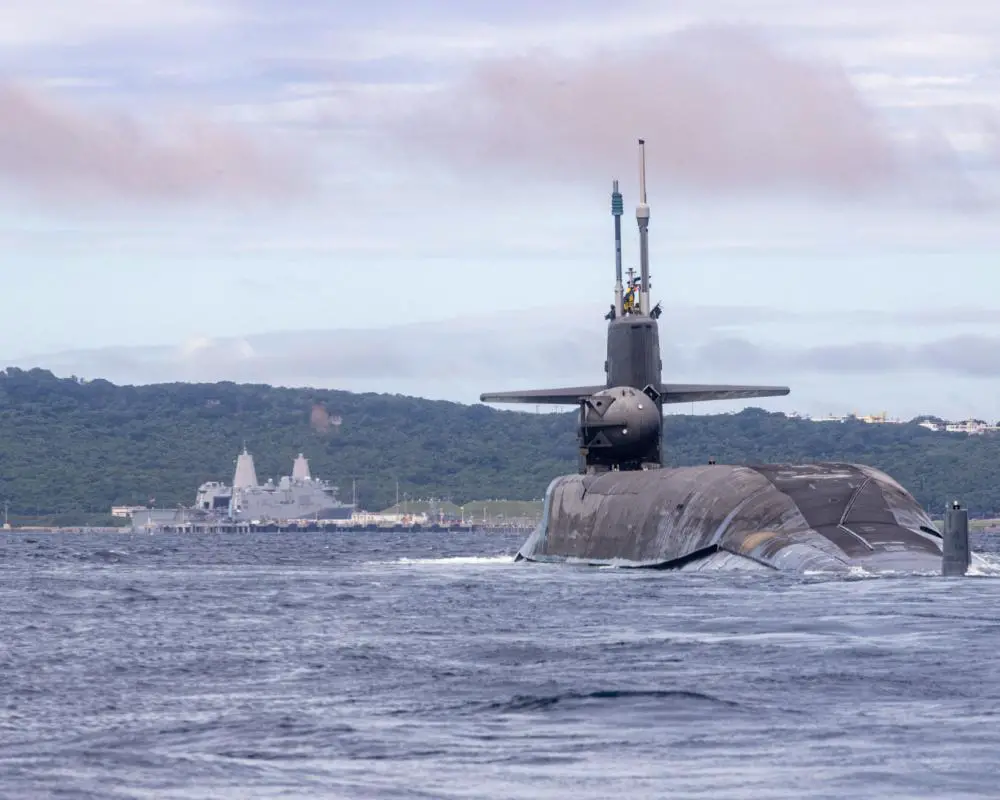The Ohio-class guided-missile submarine USS Michigan (SSGN 727) made a brief stop for personnel near Okinawa, Japan as part of her deployment to the U.S. 7th Fleet area of operations, Nov. 10, 2022. The Pacific-based submarine is operating in the U.S. 7th Fleet under the command and control of Commander, Task Force 74 to complement the undersea warfare capabilities of the region. Ohio-Class guided-missile submarines (SSGN) provide the Navy with unprecedented strike and special operation mission capabilities from a stealth, clandestine platform. Armed with tactical missiles and equipped with superior communications capabilities, SSGNs are capable of directly supporting combatant commander’s strike and special operation forces requirements.
“Having Michigan in theater adds to our already deep bench of undersea warfare capabilities throughout the region,” said Rear Adm. Rick Seif, Commander, Submarine Group 7. “Their presence demonstrates our continued commitment to providing maritime security and deterrence in the Indo-Pacific.”

Michigan was commissioned on Sept. 11, 1982. It is the second submarine of the Ohio-class of ballistic missile submarines (SSBNs) and SSGNs, and the third U.S. Navy ship to bear the name. Michigan was built to carry the Navy’s third generation submarine-launched ballistic missile, the Trident C-4. After arriving in Bangor in March 1983, Michigan would carry out her primary mission of deterrence for nearly 20 years, conducting more than 60 strategic deterrent patrols. At the conclusion of the Cold War, Michigan, Ohio and two sister ships – USS Florida (SSBN 728) and USS Georgia (SSBN 729) – were considered for decommissioning. Instead, the Navy chose to convert the Ohio-class seaframe to carry Tomahawk land attack missiles or other payloads in lieu of ballistic missiles. Michigan, based out of Naval Base Kitsap in Washington, is conducting maritime operations in the U.S. 7th Fleet area of operations in support of U.S. national security interests in the Indo-Pacific region.
As the U.S. Navy’s largest forward deployed fleet, U.S. 7th Fleet routinely operates between 50-70 ships and submarines and 140 aircraft with approximately 20,000 Sailors. 7th Fleet’s area of operation spans more than 124 million square kilometers, stretching from the International Date Line to the India/Pakistan border; and from the Kuril Islands in the North to the Antarctic in the South Pacific, providing security and stability to the region. 7th Fleet interacts with 35 other maritime nations to build partnerships that foster maritime security while conducting a wide-range of missions to support humanitarian efforts and uphold international laws and freedoms of the sea. CSG 7 directs forward-deployed, combat capable forces across the full spectrum of undersea warfare throughout the Western Pacific, Indian Ocean and Arabian Sea.















